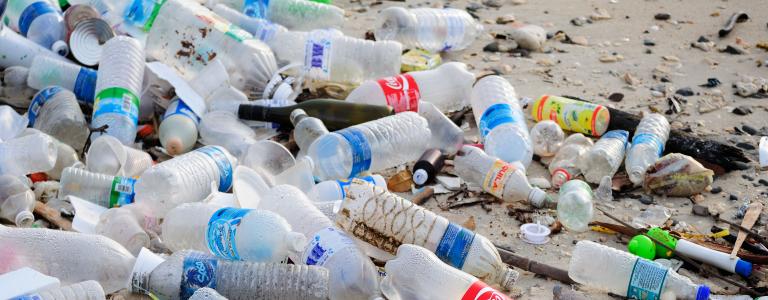Beating Plastic Pollution: If you can't reuse it, refuse it
June 5 marks World Environment Day, with a focus on reducing the heavy burden plastic pollution places on nature, wildlife and human health. This blog explains four ways we can all make a difference.
Tomorrow marks World Environment Day, with a focus on reducing the heavy burden plastic pollution places on nature, wildlife and human health.
Plastic has many valuable uses, but as a global community we have become over-reliant on single-use or disposable plastic products. In fact, the United Nations reports that half of all consumer plastics are used a single time.
To beat plastic pollution, we need to rethink how we design, produce and use plastic products.
Here are four ways we can all make a difference:
- Avoid purchasing products with excess packaging: As consumers, we can all make smarter choices, such as turning down plastic straws and cutlery or reconsidering heavily packaged products in the supermarket. With enough demand, retailers and suppliers will quickly get the message and make changes for the better.
- Choose glass or metal drink containers over plastic: Statistics suggest one million plastic bottles are bought every minute. Sure, they can be recycled, but unfortunately most of them are not. In 2016, the recycling rate for plastic bottles in the United States was around 30 per cent. That means two out of every three bottles will end up in a landfill.
- Choose wool over synthetic garments: A major source of microplastic fibers turns out to be synthetic clothing (like solar fleece jackets and pullovers). While wastewater treatment plants can effectively remove a large quantity of microplastics (up to 98 per cent), a 2016 study determined that the average wastewater treatment plant still releases 4 million particles per day (and as many as 65 million).
- Sign up to participate in a shoreline or neighbourhood cleanup near you: By picking up the litter you see in front of you, you are not only making an immediate impact, you may also be sending a strong signal that will keep people from littering in future—people litter less and use garbage bins more in places that are kept clean. Therefore, community cleanups have a wider impact by raising awareness, educating others about plastic waste and reducing the urge to litter.
Of course, individual actions alone cannot solve the plastic problem. Even if every one of us does whatever we can to reduce our plastic footprint, the problem needs to be addressed at other levels.
Governments and businesses must also play a major role, in thinking about eliminating single-use plastics at the design stage, ensuring waste management and recycling schemes are fit for purpose, and researching sustainable plastic alternatives that are both economically viable and widely available. Only then will we be able to beat plastic pollution for good.
You might also be interested in
IISD's Best of 2024: Articles
As 2024 draws to a close, we revisit our most read IISD articles of the year.
IISD's Best of 2024: Publications
As 2024 draws to a close, we revisit our most downloaded IISD publications of the year.
Nations Are Exiting a Secretive System That Protects Corporations—One Country's Story Shows How Hard That Can Be
Bolivia was the first nation to begin leaving a legal system that allows foreign companies to sue governments behind closed doors. Now, other countries are following.
Nine Wins for Sustainable Development in 2024
Looking back on 2024, let’s take a moment to pause and appreciate the positive milestones of the year. Join us in celebrating the small and big wins for global sustainability.
